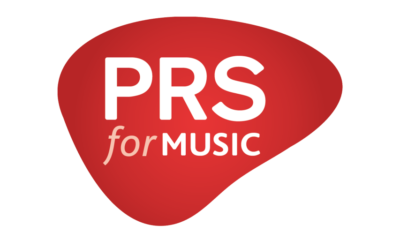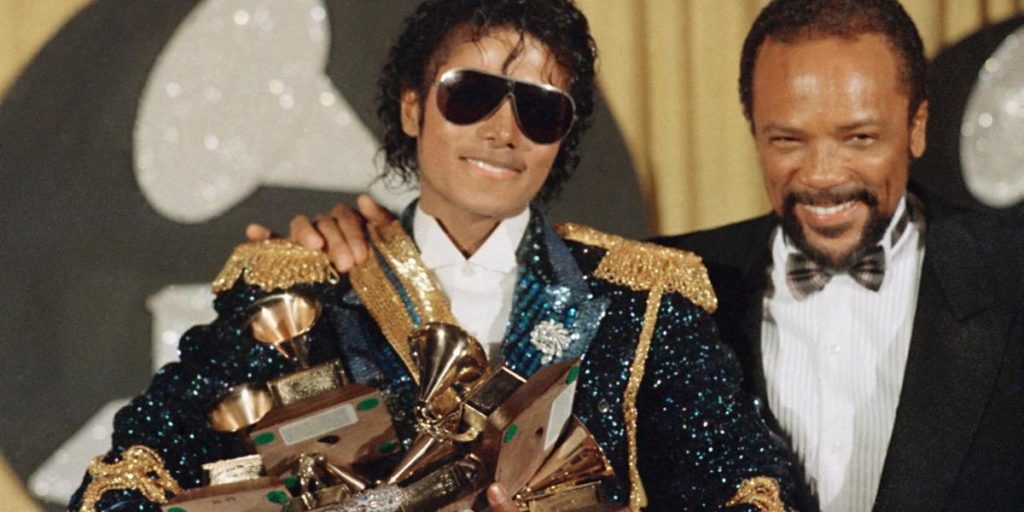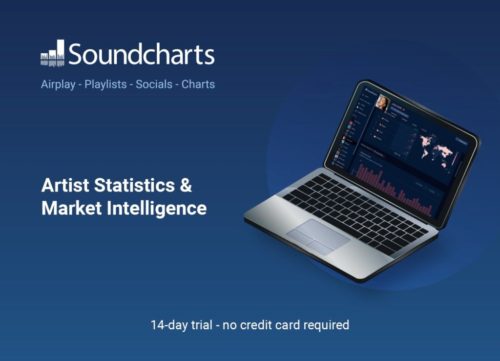Analysis
Does Megan Thee Stallion really have a “bad deal”?
Here’s what we know.
Published
4 years agoon
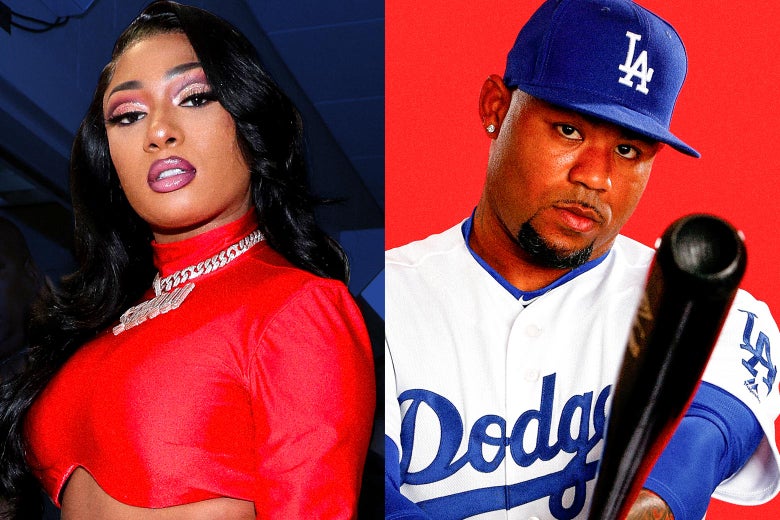
- Megan is suing 1501 Certified Entertainment, asking for the termination of her contract and a million dollars in damages.
- 1501 claims Megan has not honored her deal and has not been paying them since signing with Roc Nation.
It is now public knowledge that Houston Rapper Megan Thee Stallion is involved in a legal dispute with her record label, 1501 Certified Entertainment. Prior to dripping her third EP, S.U.G.A., today (which is not an album), it was announced that Megan was allegedly suing 1501 for the amount of $1million and asking for the complete termination of her contract. She has accused the label of ‘fraud, breach of contract, negligent misrepresentation, and other violations of civil law’. The question is, why? And is her deal really as bad as she claims?
1501 has expectedly hit back with a few claims of their own, stating that Megan has not honored the terms of her contract.
Here's what we know ...
1. Megan is yet to deliver an album to the label
According to 1501 CEO Carl Crawford, Megan signed a four-album deal with the label at the top 0f 2018. At the time, she was managed by her now-deceased mother and had a lawyer look over the deal – according to Crawford. Megan was given a $10,000 initial advance, then a further $50,000 later that year when 1501 signed a distribution deal with 300 Entertainment (totaling a $70,000 cash advance).
To date, Megan has delivered three EPs and a Mixtape to her label, but still no album.
2. Megan has a 60/40 profit split with 1501.
In court documents, it was revealed that Megan currently receives a 40% profit split from 1501. To the unfamiliar, that may seem low and unfair. In actuality, however, 40% is a very high split in the mainstream music market.
For a new artist on a major label, a typical royalty rate is usually somewhere around the 15% mark (it can be slightly less or more, depending on how many records you’ve already sold and how good of a lawyer you have). For an indie label, though (which 1501 is), it is usually a 50/50 profit split. So the 60/40 deal Megan has could be deemed unfair – which is part of her argument against 1501. However, according to Music Copyright Lawyer Brandon Clark, “it isn’t so low that it would immediately be shocking“. Furthermore, for the amount of money that 1501 has allegedly invested in Megan’s career, a 60/40 split could be seen as very generous. Which brings us to the next point.
...a typical 'hit record' can cost anywhere up to a million dollars.
3. 1501 claims to have invested at least $500,000 - $800,000 in Megan's career.
In an interview with Billboard, Carl Crawford claims that 1501 has receipts of between 5-$800,000 of investments made in Megan Thee Stallion’s career since she signed with them 2 years ago. Which, if true, equates their funding to that of a major record label. Thus, making the 60/40 split a very generous deal – especially for an artist who, at the time of signing, had no major success.
Furthermore, reflecting on the viral impact of Megan’s “Hot Girl Summer” smash last year, it is quite easy to believe 1501 have in fact put this much money behind Megan. The single was Megan’s first #1 on Billboard (on the Rhythmic Charts and #11 on the Hot 100) – which qualifies it as a major “hit”. And a typical “hit record” can cost anywhere up to a million dollars to become such. From digital marketing, TV & Radio promo and beyond – it all costs, very big bucks. There’s no telling how much was spent on the marketing for “Hot Girl Summer“, however it was more than likely in the six-figure range.
4. Megan claims that 1501 did not want to approve her budget for SUGA
All budgets must be approved by a label prior to a release. This is standard practice. And, without context of the situation, it is difficult point the finger in either direction on this point.
View this post on InstagramA post shared by Hot Girl Meg (@theestallion) on
5. Crawford claims the Megan has not been paying the label what she owes from her touring income since she signed with Roc Nation.
Megan signed a separate management deal with Roc Nation last September – during the height of the ‘Hot Girl Summer’ success. Since which time, Crawford claims she has not paid the label what she owes them from her touring income (agreed as part of her ’70/30 split’ 360 deal with them).
This may be the reason why the label wanted to put a hold on her releasing any new music – perhaps just until that issue has been resolved. This wouldn’t necessarily be unfair of them, but there is likely more to the story than we know.
6. Megan owns part of her master recordings in her current deal with 1501.
When you sign a recording agreement with a record company, you are typically giving up the rights to your master recordings – that’s essentially what a traditional record deal is. In Megan’s deal, however, she shares in the ownership of her masters. This is typically unheard of for a new artist, particular if a label is putting up the kind of capital that 1501 has claimed they’ve put into building Thee Stallion since 2018.
There seems to be a little conflict here, as the lawsuit filed by Megan’s lawyer claims one thing, but Megan claims another. Is the deal “so bad” that she wants out? Or is her new management at Roc Nation trying to get a bigger piece of her pie – and thus, encouraging Megan to try and find a way to alter the terms of her deal?
Owen Sloane, a music lawyer did state that the suit “sounds like a tactic to secure a renegotiation“. However, it’s tough to make assertions in a case like this from the outside in – so we ultimately have no choice but to see how this plays out in court. If there’s anything to learn here, though, it is to make sure you always read the fine print. In a world full of free resources and information, there aren’t too many excuses for signing “shady deals”.
This story is developing…
Ryan J. Bruce
Analysis
Canada Slashes Kendrick Lamar’s Radio Play By 25%, While Drake Sees a 10% Decline In The U.S.
MBN Exclusive: New Soundcharts Data Shows The Cogs Working Behind Rap’s Hottest War.
Published
2 months agoon
Thursday, 6 June 2024 @ 20:51 EDT
Story Highlights
New data provides unprecedented insight into the underlying methodology of the Drake-Kendrick feud crucial to understanding the broader battle for hip-hop supremacy.
Few rivalries in the high-stakes world of hip hop superstardom have captured the cultural zeitgeist as completely as the recent feud between ‘Rap Gods’ Drake and Kendrick Lamar. Being two of the genre’s OGs, their every move sent reverberations through the music industry and beyond. A lot of the conversation around the ‘slugfest’ revolved around the surface-level spectacle of the diss tracks and opinions among fans, but the real narrative that shapes this feud is the one presented in the data (the streaming numbers, radio spins and listener trends that provide an insight into the way the two superstars’ strategies prior to the ‘war of words’ helped them to navigate this war behind the scenes.
A Geographic Dividend
As we previously reported at Music Biz Nation, data from Luminate – a premier music analytics company – showed an slight difference in how Drake and Kendrick diss tracks were being consumed regionally versus internationally in comparison to their overall catalogs. In Kendrick’s case, American listeners were responsible for 62.2% of streams on his Drake diss tracks, 11.5% above his typical 50.7% U.S. share. Meanwhile, Drake saw only a small boost in U.S. streams for his Kendrick disses, bumping from 58.9% to 60.1% – with the remainder coming from international markets.
Getting more specific, Kendrick’s top listenership on Spotify stems from Los Angeles (also his top radio market), London and Chicago (all seeing a 2-3% monthly increase in the past month). Drake still comfortably maintained an 82.5 million to Kendrick’s 78 million in Spotify monthly listeners over the past 28 days, with his top markets on the platform being London, Los Angeles, and New York. Notably, Drake saw a 1-2% dip in listenership in all three of his top markets, while Kendrick gained ground in each of them.
The Streaming Showdown: Loyalty vs. Virality
In the wake of Kendrick’s numerous diss tracks, including the most popular of them all “Not Like Us,” (amassing 280 million streams and 2,000+ playlist placements on Spotify alone) his monthly Spotify listener count surged by an impressive 27 million. Drake, meanwhile, saw a comparatively modest dip of 1.5 million monthly listeners since the start of the feud, with his most popular Kendrick-diss “Family Matters” totaling a mere 66 million Spotify streams and 700 playlists on the platform. On the surface, this might suggest a clear win for Kendrick. However, a deeper dive into listener retention rates tells a more complex story.
Drake’s retention rate actually increased from 105% to 109% during this period, indicating that his core fanbase remains remarkably steadfast in their loyalty, even in the face of Kendrick’s onslaught. Additionally, Drake’s monthly listener count on Spotify, even after a 1.5 million dip, still towers over Kendrick’s but only slightly at 82.5 million to 78 million – a much closer gap than before the ‘war’.
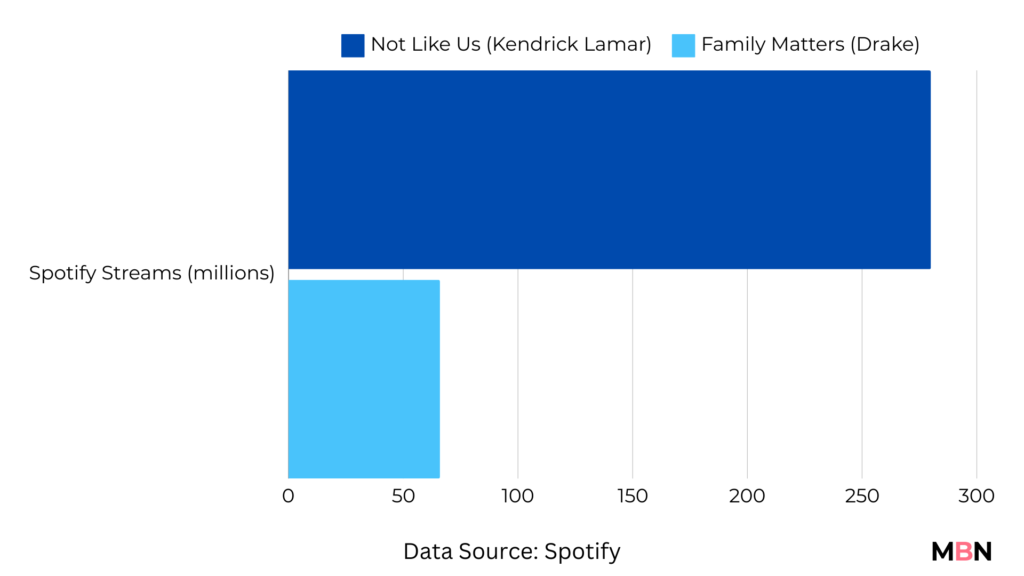
Kendrick, on the other hand, saw his retention rate plummet from 43% to 38%, suggesting that many of his newly-gained listeners may be more curious onlookers than devoted fans.
This data paints a picture of two contrasting strategies – one focused on cultivating deep, lasting loyalty, the other on generating viral moments and sparking widespread curiosity. While Kendrick’s approach may be winning the battle for short-term attention, Drake’s strategy could prove more effective in the long-term war for enduring dominance.
Kendrick’s cultural references in his diss tracks is likely what ignited and engaged more of his U.S. audience. Meanwhile, the strength of his overall catalog has allowed Drake to rely on his status as a global superstar, betting on the continued reliability of his massive global audience to absorb any blowback.
Radio Waves Shift: Kendrick's Domestic Surge
Soundcharts data also point to a change in radio play dynamics over the last month. While Drake’s radio spins dipped slightly in the U.S. (-9%) and U.K. (-6%) – two of his top markets – Kendrick Lamar has seen an 80% increase in U.S. radio play in the wake of feud. Lamar’s increased radio play in the U.S. was, unsurprisingly, driven by airplay of “Not Like Us” in the Los Angeles area (his home county) on stations such as Power106 and KRRL-FM Real 92.3 (responsible for Kendrick’s highest number of global radio plays over the last month).
Most tellingly, but somewhat expected, the LA-based Real 92.3, the station that has been Kendrick’s staunchest cheerleader, cut Drake’s airplay by a staggering 30% during the month of May.
This domestic dominant radio surge for Kendrick, coupled with the increase in U.S. streaming share for his diss tracks might speak to the effectiveness of his regionally-focused strategy in comparison to Drake’s. And with the U.S. being the biggest market for the Hip Hop genre, it is not difficult to see why a strategy like this has created such an impact in his battle with the Toronto-based rapper.
In Drake’s case, despite facing slight challenges in the U.S. radio market during the feud, the ‘6 God’ has managed to maintain his global radio dominance by making up ground key local and international markets in regions such as France (up 12%) and his home country of Canada (up 8%), where Kendrick has seen a 25% decline in airplay.
In saying that, like Drake, Kendrick has also compensated by making significant progress in other international radio markets over the past month – such as Nigeria (+104% in spins) and portions of Europe (U.K. +40%, Belgium +27%, Germany +26%, ).
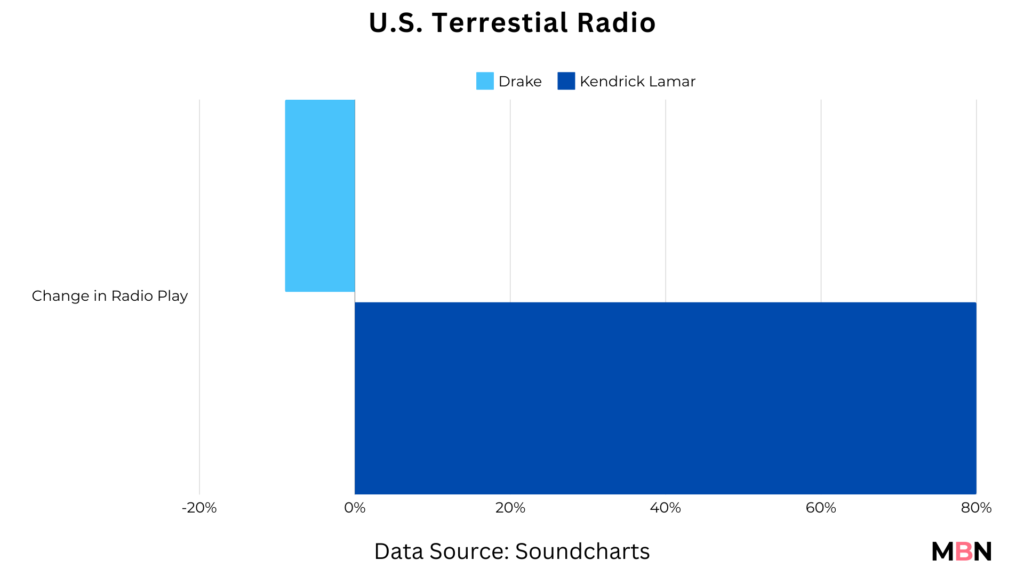
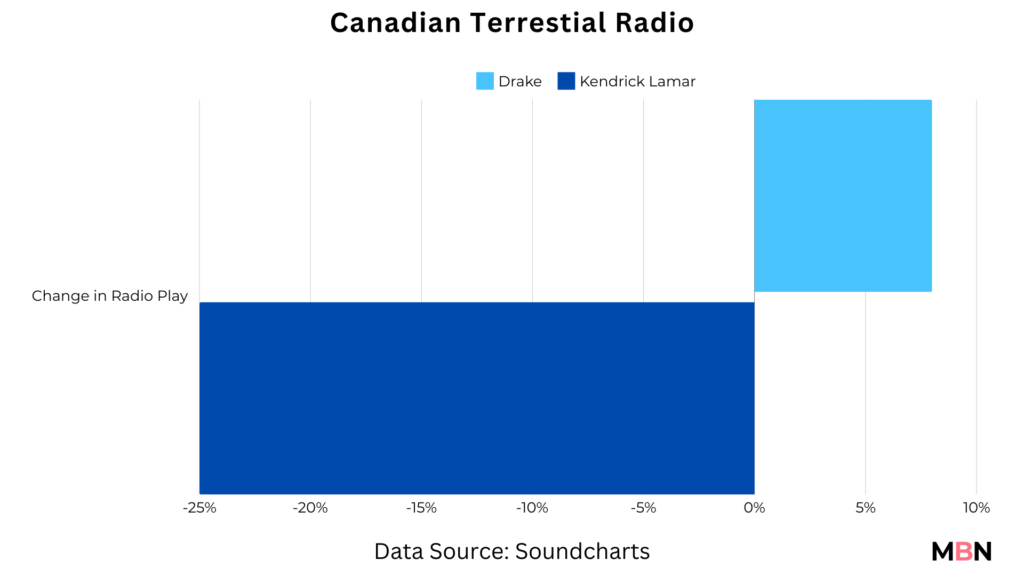
Kendrick's Viral Breakthrough: The TikTok Wildcard
Where Drake may be ahead in terms of the raw numbers of streams and spins of his overall catalog, when it comes to the virality of this feud, Kendrick has taken the crown by more than a mile.
In just one month after its release, “Not Like Us” was the soundtrack for 560,000+ TikTok videos and 1.4 billion views, quickly becoming his third most popular song on the platform as lead artist (surpassing “We Cry Together”, from his most recent album ‘Mr. Morale & The Big Steppers’). The uptick is arguably a testament to Kendrick’s ‘hidden’ ability to create a moment that lands with TikTok’s wide audience often moved by the winds of popularity – something Drake was more known for excelling at prior to the feud. Drizzy’s most popular TikTok song “Tootsie Slide” has amassed 2.8 million videos and 8.2 billion views, compared to Kendrick’s 1.1 million videos and 1.3 billion videos for his most popular TikTok song “HUMBLE”. Notably, “Not Like Us” has accumulated more TikTok views than “HUMBLE.” with half the number of videos, speaking to its undeniable cultural impact.
Drake’s most popular song in the ‘back and forth’ with Lamar, “Family Matters”, stands at just 1,800 TikTok videos and 7.5 million views.
In an era where a single viral moment can redefine an artist’s trajectory, Kendrick’s overwhelming TikTok triumph in this feud could be an extremely powerful weapon in his arsenal. If he can sustain this momentum and translate the buzz into lasting listener growth and engagement, it could dramatically redefine of his overall positioning. Should the feud continue in any way, this is a wildcard that Drake (despite his overall dominance) cannot afford to ignore.
Looking Ahead...
With all that said, one thing is clear: the Drake-Kendrick beef was much more than a rap beef. As the reams of data show, it’s a rich, multifaceted playbook for how different strategies can determine equally impactful yet completely different outcomes. Every artist has their own unique arsenal of strengths and strategies — Drake’s unbreakable global grip and resistance to wobble in the storm, Kendrick’s gift for the viral moment and local relevance — which we’ll continue to watch with his future releases.
Get weekly music biz updates straight to your inbox.
Ryan J. Bruce
Analysis
Drake vs. Kendrick: How Their Diss Track Data Reveals Divergent Paths to Streaming Dominance
Luminate’s streaming data from Drake and Kendrick Lamar’s viral diss tracks uncovers two starkly different blueprints for sustaining audience engagement in the streaming era.
Published
2 months agoon
Wednesday, 29 May 2024 @ 14:42 EDT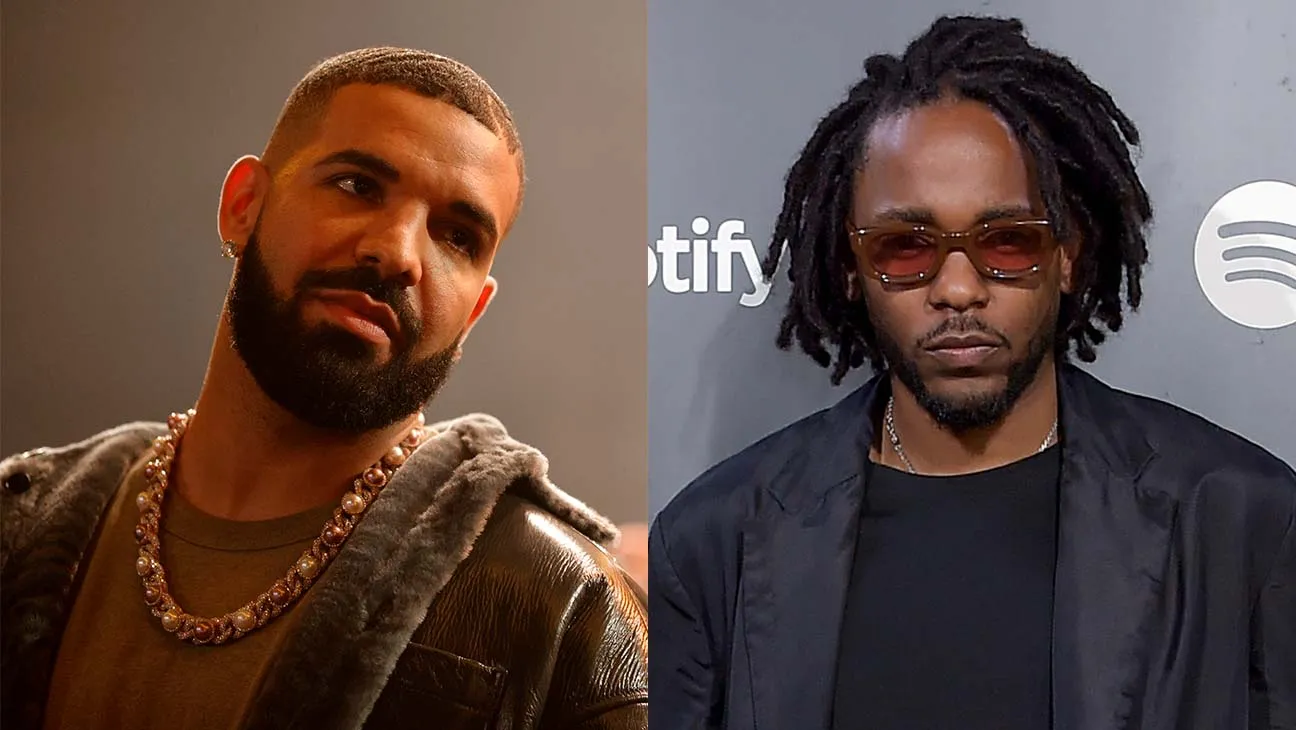
Story Highlights
Luminate’s data on the diss tracks demonstrate two starkly different blueprints for sustainability in the streaming era.
The recent diss track showdown between hip hop giants Kendrick Lamar and Drake undoubtedly captured the attention of music fans across the globe. The lyrical jabs traded between the rap heavyweights on their respective diss tracks not only lit up social media with heated debates among diehard fans, but also drew in more casual observers, brands, and even political figures to join the online discourse.
Speaking to political media outlet The Hill, Rep. Jamaal Bowman (D-N.Y.) stated: “Hopefully, it inspires others to keep the culture going in the most in the best ways possible”. Further adding that “it is bringing attention to the culture” and “showing the creative brilliance of emcees.”
However, while much of the conversation centered around the subjective question of who emerged victorious, new data from music analytics firm Luminate reveals an interesting discrepancy in the geographic streaming breakdown for the diss tracks compared to the rappers’ overall catalogs.
Kendrick Lamar Sees Significant Spike in U.S. Streaming Share
For Drake, streams of his diss tracks skewed slightly more domestic, with U.S. listeners accounting for 60.1% of the total, a modest uptick from his typical 58.9% U.S. streaming share. On the flip side, the difference was much more pronounced for Kendrick Lamar.
Lamar’s catalog normally posts a nearly even 50.7% U.S. to 49.3% non-U.S. split. But for his Drake-diss tracks, domestic U.S. audiences represented a 62.2% majority of total streams, a substantial 11.5 percentage point increase versus his usual U.S. audience share.
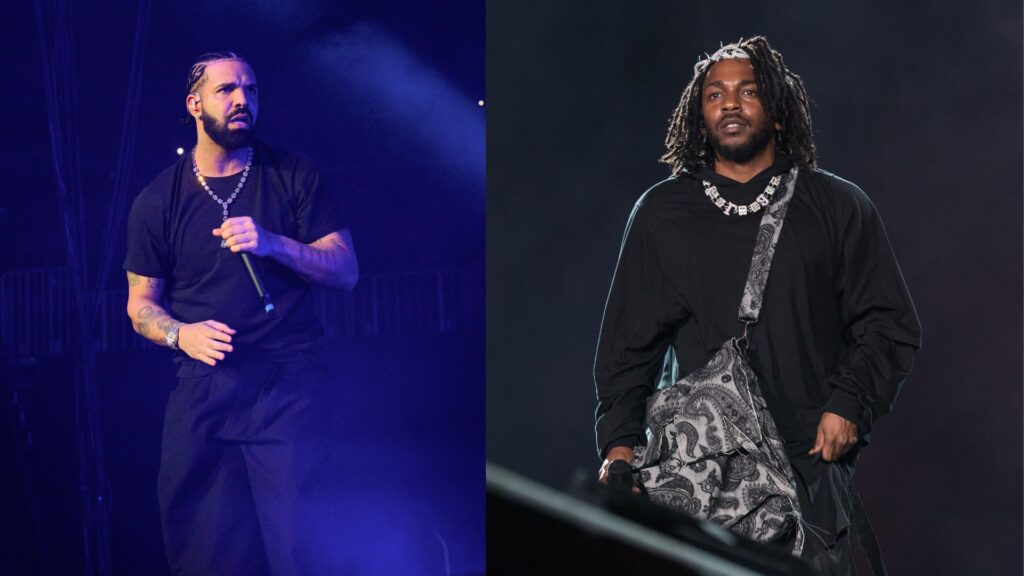
Divergent Approaches, Common Goal
Placed side-by-side, the Luminate data presents a study in contrasts. For Kendrick, the diss track numbers hint at the potential rewards of striking a chord (no pun intended) with a specific regional audience. Whereas for Drake, the numbers might showcase the value of maintaining a solid global listenership that can weather any storm.
As the streaming landscape grows ever-more saturated and competitive, the stakes of these strategies are only getting higher. With so many artists vying for a finite share of listener attention, the ability to accurately identify and capitalize on opportunities for local resonance while maintaining a loyal global fanbase has become an almost-essential strategy.
Ultimately, the Luminate data makes it clear that, in the age of on-demand audio, there’s no one-size-fits-all formula for sustainable success. With the world of streaming continuing to evolve, artists who can effectively leverage real-time audience data to inform their strategies may be the ones best-positioned to navigate the current and future landscape. This may involve carefully calibrating their approach to strike a balance between cultivating deep regional resonance and maintaining a broad, mainstream appeal that translates across borders.
While the Drake-Kendrick data highlights two contrasting strategic approaches, it underscores one universal imperative: in an increasingly crowded arena, appeal and agility are among an artist’s most valuable assets
Get weekly music biz updates straight to your inbox.
Ryan J. Bruce

Canada Slashes Kendrick Lamar’s Radio Play By 25%, While Drake Sees a 10% Decline In The U.S.

Sony Reportedly in Talks for $1 Billion Queen Catalog Acquisition

Drake vs. Kendrick: How Their Diss Track Data Reveals Divergent Paths to Streaming Dominance

Albums Chart Data: Swift & Eilish Dominate UK & US Listings







